Legalization of Marijuana: An Argumentative Analysis of its Impact
VerifiedAdded on 2023/05/29
|11
|2973
|358
Essay
AI Summary
This argumentative essay delves into the complex issue of marijuana legalization, particularly in the context of Canada's 2018 decision. It examines the government's rationale for legalization, including curbing the black market and controlling drug distribution, while also addressing the potential negative impacts on public health, particularly concerning mental health, addiction, and physical well-being. The essay contrasts the properties and effects of medicinal versus recreational cannabis, highlighting the risks associated with higher THC levels in recreational use. It further explores conflicting studies on the effects of cannabis on anxiety and dependence, and the concerns raised by public health workers regarding the potential harm to youth. The essay concludes by weighing the economic benefits of legalization against the potential health detriments, ultimately questioning whether the benefits outweigh the risks of irresponsible use.
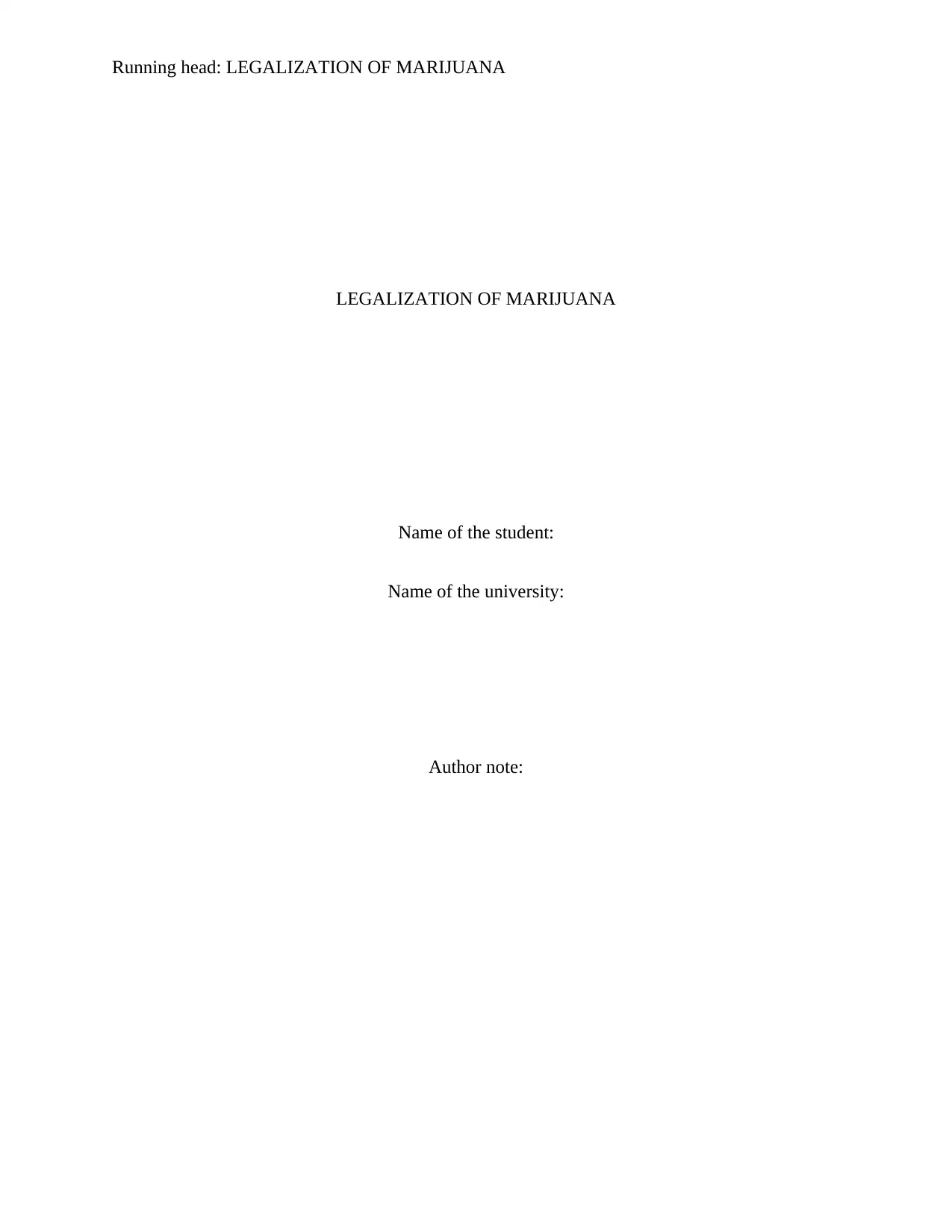
Running head: LEGALIZATION OF MARIJUANA
LEGALIZATION OF MARIJUANA
Name of the student:
Name of the university:
Author note:
LEGALIZATION OF MARIJUANA
Name of the student:
Name of the university:
Author note:
Paraphrase This Document
Need a fresh take? Get an instant paraphrase of this document with our AI Paraphraser
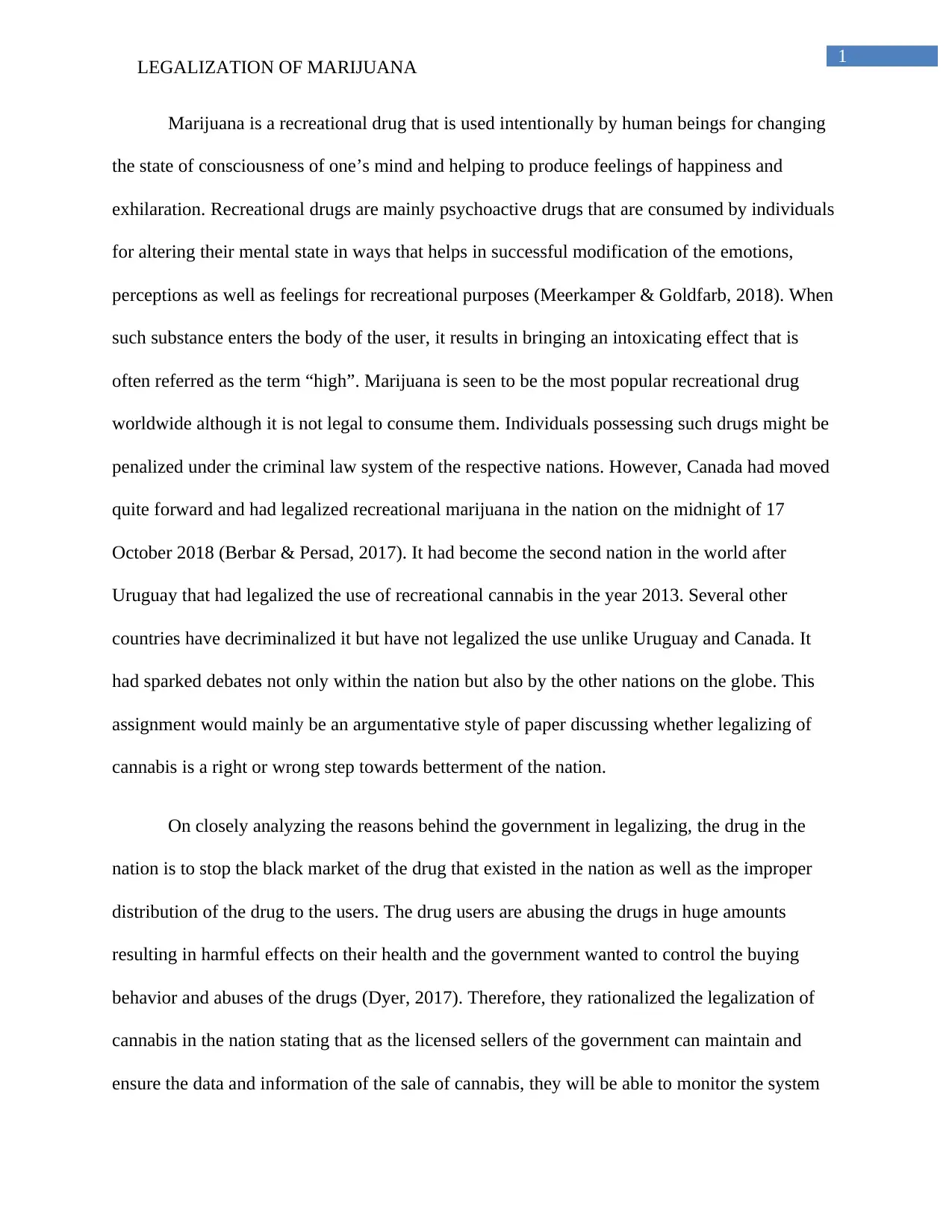
1
LEGALIZATION OF MARIJUANA
Marijuana is a recreational drug that is used intentionally by human beings for changing
the state of consciousness of one’s mind and helping to produce feelings of happiness and
exhilaration. Recreational drugs are mainly psychoactive drugs that are consumed by individuals
for altering their mental state in ways that helps in successful modification of the emotions,
perceptions as well as feelings for recreational purposes (Meerkamper & Goldfarb, 2018). When
such substance enters the body of the user, it results in bringing an intoxicating effect that is
often referred as the term “high”. Marijuana is seen to be the most popular recreational drug
worldwide although it is not legal to consume them. Individuals possessing such drugs might be
penalized under the criminal law system of the respective nations. However, Canada had moved
quite forward and had legalized recreational marijuana in the nation on the midnight of 17
October 2018 (Berbar & Persad, 2017). It had become the second nation in the world after
Uruguay that had legalized the use of recreational cannabis in the year 2013. Several other
countries have decriminalized it but have not legalized the use unlike Uruguay and Canada. It
had sparked debates not only within the nation but also by the other nations on the globe. This
assignment would mainly be an argumentative style of paper discussing whether legalizing of
cannabis is a right or wrong step towards betterment of the nation.
On closely analyzing the reasons behind the government in legalizing, the drug in the
nation is to stop the black market of the drug that existed in the nation as well as the improper
distribution of the drug to the users. The drug users are abusing the drugs in huge amounts
resulting in harmful effects on their health and the government wanted to control the buying
behavior and abuses of the drugs (Dyer, 2017). Therefore, they rationalized the legalization of
cannabis in the nation stating that as the licensed sellers of the government can maintain and
ensure the data and information of the sale of cannabis, they will be able to monitor the system
LEGALIZATION OF MARIJUANA
Marijuana is a recreational drug that is used intentionally by human beings for changing
the state of consciousness of one’s mind and helping to produce feelings of happiness and
exhilaration. Recreational drugs are mainly psychoactive drugs that are consumed by individuals
for altering their mental state in ways that helps in successful modification of the emotions,
perceptions as well as feelings for recreational purposes (Meerkamper & Goldfarb, 2018). When
such substance enters the body of the user, it results in bringing an intoxicating effect that is
often referred as the term “high”. Marijuana is seen to be the most popular recreational drug
worldwide although it is not legal to consume them. Individuals possessing such drugs might be
penalized under the criminal law system of the respective nations. However, Canada had moved
quite forward and had legalized recreational marijuana in the nation on the midnight of 17
October 2018 (Berbar & Persad, 2017). It had become the second nation in the world after
Uruguay that had legalized the use of recreational cannabis in the year 2013. Several other
countries have decriminalized it but have not legalized the use unlike Uruguay and Canada. It
had sparked debates not only within the nation but also by the other nations on the globe. This
assignment would mainly be an argumentative style of paper discussing whether legalizing of
cannabis is a right or wrong step towards betterment of the nation.
On closely analyzing the reasons behind the government in legalizing, the drug in the
nation is to stop the black market of the drug that existed in the nation as well as the improper
distribution of the drug to the users. The drug users are abusing the drugs in huge amounts
resulting in harmful effects on their health and the government wanted to control the buying
behavior and abuses of the drugs (Dyer, 2017). Therefore, they rationalized the legalization of
cannabis in the nation stating that as the licensed sellers of the government can maintain and
ensure the data and information of the sale of cannabis, they will be able to monitor the system
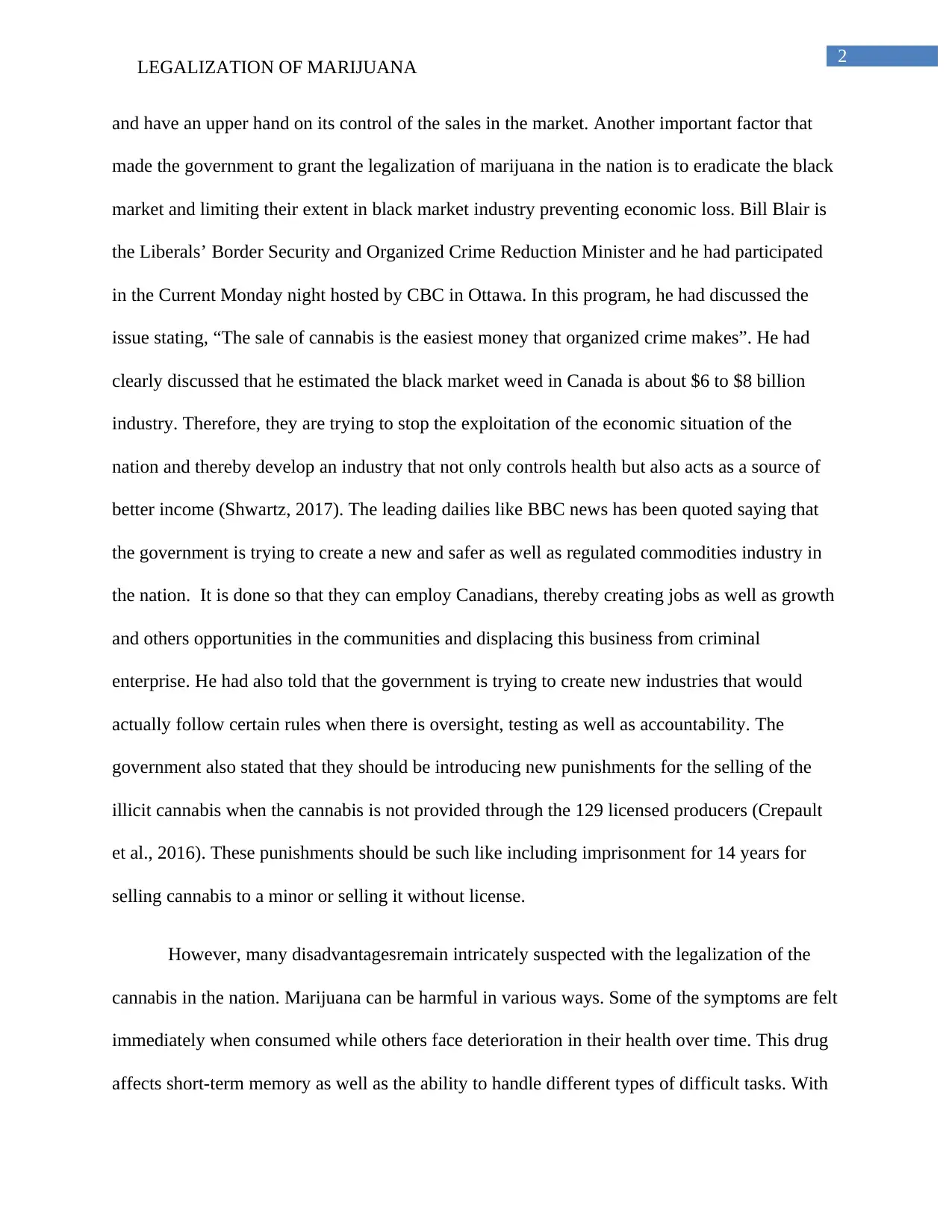
2
LEGALIZATION OF MARIJUANA
and have an upper hand on its control of the sales in the market. Another important factor that
made the government to grant the legalization of marijuana in the nation is to eradicate the black
market and limiting their extent in black market industry preventing economic loss. Bill Blair is
the Liberals’ Border Security and Organized Crime Reduction Minister and he had participated
in the Current Monday night hosted by CBC in Ottawa. In this program, he had discussed the
issue stating, “The sale of cannabis is the easiest money that organized crime makes”. He had
clearly discussed that he estimated the black market weed in Canada is about $6 to $8 billion
industry. Therefore, they are trying to stop the exploitation of the economic situation of the
nation and thereby develop an industry that not only controls health but also acts as a source of
better income (Shwartz, 2017). The leading dailies like BBC news has been quoted saying that
the government is trying to create a new and safer as well as regulated commodities industry in
the nation. It is done so that they can employ Canadians, thereby creating jobs as well as growth
and others opportunities in the communities and displacing this business from criminal
enterprise. He had also told that the government is trying to create new industries that would
actually follow certain rules when there is oversight, testing as well as accountability. The
government also stated that they should be introducing new punishments for the selling of the
illicit cannabis when the cannabis is not provided through the 129 licensed producers (Crepault
et al., 2016). These punishments should be such like including imprisonment for 14 years for
selling cannabis to a minor or selling it without license.
However, many disadvantagesremain intricately suspected with the legalization of the
cannabis in the nation. Marijuana can be harmful in various ways. Some of the symptoms are felt
immediately when consumed while others face deterioration in their health over time. This drug
affects short-term memory as well as the ability to handle different types of difficult tasks. With
LEGALIZATION OF MARIJUANA
and have an upper hand on its control of the sales in the market. Another important factor that
made the government to grant the legalization of marijuana in the nation is to eradicate the black
market and limiting their extent in black market industry preventing economic loss. Bill Blair is
the Liberals’ Border Security and Organized Crime Reduction Minister and he had participated
in the Current Monday night hosted by CBC in Ottawa. In this program, he had discussed the
issue stating, “The sale of cannabis is the easiest money that organized crime makes”. He had
clearly discussed that he estimated the black market weed in Canada is about $6 to $8 billion
industry. Therefore, they are trying to stop the exploitation of the economic situation of the
nation and thereby develop an industry that not only controls health but also acts as a source of
better income (Shwartz, 2017). The leading dailies like BBC news has been quoted saying that
the government is trying to create a new and safer as well as regulated commodities industry in
the nation. It is done so that they can employ Canadians, thereby creating jobs as well as growth
and others opportunities in the communities and displacing this business from criminal
enterprise. He had also told that the government is trying to create new industries that would
actually follow certain rules when there is oversight, testing as well as accountability. The
government also stated that they should be introducing new punishments for the selling of the
illicit cannabis when the cannabis is not provided through the 129 licensed producers (Crepault
et al., 2016). These punishments should be such like including imprisonment for 14 years for
selling cannabis to a minor or selling it without license.
However, many disadvantagesremain intricately suspected with the legalization of the
cannabis in the nation. Marijuana can be harmful in various ways. Some of the symptoms are felt
immediately when consumed while others face deterioration in their health over time. This drug
affects short-term memory as well as the ability to handle different types of difficult tasks. With
⊘ This is a preview!⊘
Do you want full access?
Subscribe today to unlock all pages.

Trusted by 1+ million students worldwide
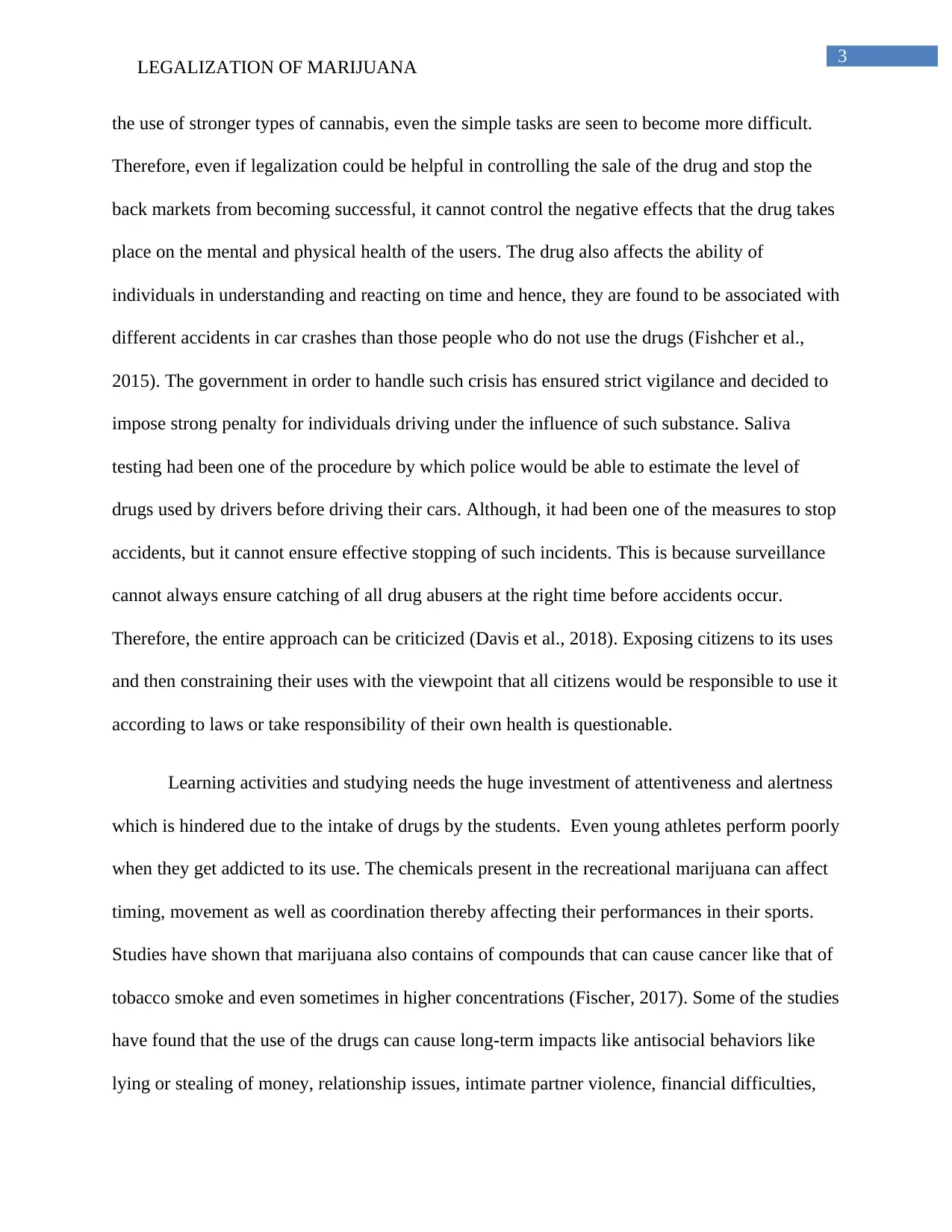
3
LEGALIZATION OF MARIJUANA
the use of stronger types of cannabis, even the simple tasks are seen to become more difficult.
Therefore, even if legalization could be helpful in controlling the sale of the drug and stop the
back markets from becoming successful, it cannot control the negative effects that the drug takes
place on the mental and physical health of the users. The drug also affects the ability of
individuals in understanding and reacting on time and hence, they are found to be associated with
different accidents in car crashes than those people who do not use the drugs (Fishcher et al.,
2015). The government in order to handle such crisis has ensured strict vigilance and decided to
impose strong penalty for individuals driving under the influence of such substance. Saliva
testing had been one of the procedure by which police would be able to estimate the level of
drugs used by drivers before driving their cars. Although, it had been one of the measures to stop
accidents, but it cannot ensure effective stopping of such incidents. This is because surveillance
cannot always ensure catching of all drug abusers at the right time before accidents occur.
Therefore, the entire approach can be criticized (Davis et al., 2018). Exposing citizens to its uses
and then constraining their uses with the viewpoint that all citizens would be responsible to use it
according to laws or take responsibility of their own health is questionable.
Learning activities and studying needs the huge investment of attentiveness and alertness
which is hindered due to the intake of drugs by the students. Even young athletes perform poorly
when they get addicted to its use. The chemicals present in the recreational marijuana can affect
timing, movement as well as coordination thereby affecting their performances in their sports.
Studies have shown that marijuana also contains of compounds that can cause cancer like that of
tobacco smoke and even sometimes in higher concentrations (Fischer, 2017). Some of the studies
have found that the use of the drugs can cause long-term impacts like antisocial behaviors like
lying or stealing of money, relationship issues, intimate partner violence, financial difficulties,
LEGALIZATION OF MARIJUANA
the use of stronger types of cannabis, even the simple tasks are seen to become more difficult.
Therefore, even if legalization could be helpful in controlling the sale of the drug and stop the
back markets from becoming successful, it cannot control the negative effects that the drug takes
place on the mental and physical health of the users. The drug also affects the ability of
individuals in understanding and reacting on time and hence, they are found to be associated with
different accidents in car crashes than those people who do not use the drugs (Fishcher et al.,
2015). The government in order to handle such crisis has ensured strict vigilance and decided to
impose strong penalty for individuals driving under the influence of such substance. Saliva
testing had been one of the procedure by which police would be able to estimate the level of
drugs used by drivers before driving their cars. Although, it had been one of the measures to stop
accidents, but it cannot ensure effective stopping of such incidents. This is because surveillance
cannot always ensure catching of all drug abusers at the right time before accidents occur.
Therefore, the entire approach can be criticized (Davis et al., 2018). Exposing citizens to its uses
and then constraining their uses with the viewpoint that all citizens would be responsible to use it
according to laws or take responsibility of their own health is questionable.
Learning activities and studying needs the huge investment of attentiveness and alertness
which is hindered due to the intake of drugs by the students. Even young athletes perform poorly
when they get addicted to its use. The chemicals present in the recreational marijuana can affect
timing, movement as well as coordination thereby affecting their performances in their sports.
Studies have shown that marijuana also contains of compounds that can cause cancer like that of
tobacco smoke and even sometimes in higher concentrations (Fischer, 2017). Some of the studies
have found that the use of the drugs can cause long-term impacts like antisocial behaviors like
lying or stealing of money, relationship issues, intimate partner violence, financial difficulties,
Paraphrase This Document
Need a fresh take? Get an instant paraphrase of this document with our AI Paraphraser
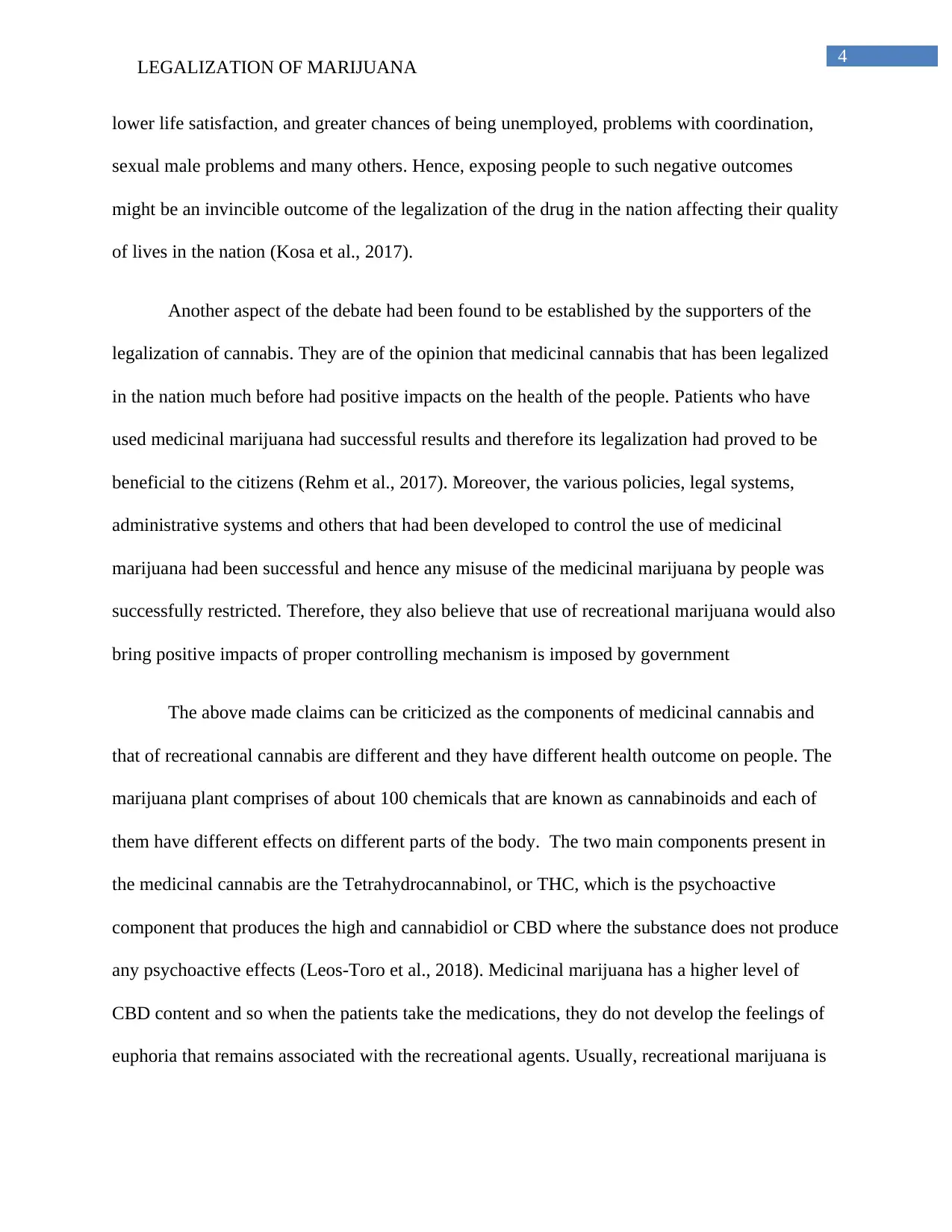
4
LEGALIZATION OF MARIJUANA
lower life satisfaction, and greater chances of being unemployed, problems with coordination,
sexual male problems and many others. Hence, exposing people to such negative outcomes
might be an invincible outcome of the legalization of the drug in the nation affecting their quality
of lives in the nation (Kosa et al., 2017).
Another aspect of the debate had been found to be established by the supporters of the
legalization of cannabis. They are of the opinion that medicinal cannabis that has been legalized
in the nation much before had positive impacts on the health of the people. Patients who have
used medicinal marijuana had successful results and therefore its legalization had proved to be
beneficial to the citizens (Rehm et al., 2017). Moreover, the various policies, legal systems,
administrative systems and others that had been developed to control the use of medicinal
marijuana had been successful and hence any misuse of the medicinal marijuana by people was
successfully restricted. Therefore, they also believe that use of recreational marijuana would also
bring positive impacts of proper controlling mechanism is imposed by government
The above made claims can be criticized as the components of medicinal cannabis and
that of recreational cannabis are different and they have different health outcome on people. The
marijuana plant comprises of about 100 chemicals that are known as cannabinoids and each of
them have different effects on different parts of the body. The two main components present in
the medicinal cannabis are the Tetrahydrocannabinol, or THC, which is the psychoactive
component that produces the high and cannabidiol or CBD where the substance does not produce
any psychoactive effects (Leos-Toro et al., 2018). Medicinal marijuana has a higher level of
CBD content and so when the patients take the medications, they do not develop the feelings of
euphoria that remains associated with the recreational agents. Usually, recreational marijuana is
LEGALIZATION OF MARIJUANA
lower life satisfaction, and greater chances of being unemployed, problems with coordination,
sexual male problems and many others. Hence, exposing people to such negative outcomes
might be an invincible outcome of the legalization of the drug in the nation affecting their quality
of lives in the nation (Kosa et al., 2017).
Another aspect of the debate had been found to be established by the supporters of the
legalization of cannabis. They are of the opinion that medicinal cannabis that has been legalized
in the nation much before had positive impacts on the health of the people. Patients who have
used medicinal marijuana had successful results and therefore its legalization had proved to be
beneficial to the citizens (Rehm et al., 2017). Moreover, the various policies, legal systems,
administrative systems and others that had been developed to control the use of medicinal
marijuana had been successful and hence any misuse of the medicinal marijuana by people was
successfully restricted. Therefore, they also believe that use of recreational marijuana would also
bring positive impacts of proper controlling mechanism is imposed by government
The above made claims can be criticized as the components of medicinal cannabis and
that of recreational cannabis are different and they have different health outcome on people. The
marijuana plant comprises of about 100 chemicals that are known as cannabinoids and each of
them have different effects on different parts of the body. The two main components present in
the medicinal cannabis are the Tetrahydrocannabinol, or THC, which is the psychoactive
component that produces the high and cannabidiol or CBD where the substance does not produce
any psychoactive effects (Leos-Toro et al., 2018). Medicinal marijuana has a higher level of
CBD content and so when the patients take the medications, they do not develop the feelings of
euphoria that remains associated with the recreational agents. Usually, recreational marijuana is
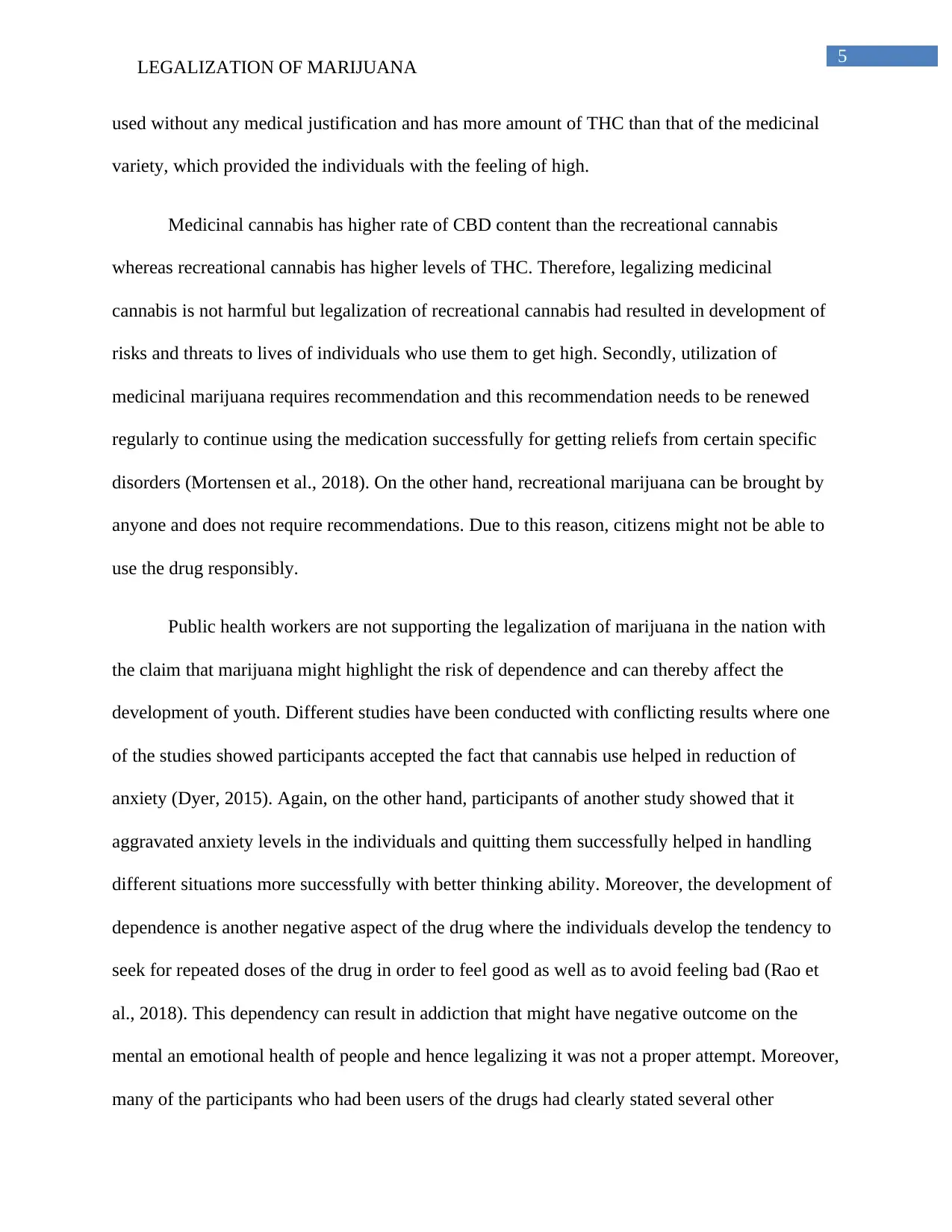
5
LEGALIZATION OF MARIJUANA
used without any medical justification and has more amount of THC than that of the medicinal
variety, which provided the individuals with the feeling of high.
Medicinal cannabis has higher rate of CBD content than the recreational cannabis
whereas recreational cannabis has higher levels of THC. Therefore, legalizing medicinal
cannabis is not harmful but legalization of recreational cannabis had resulted in development of
risks and threats to lives of individuals who use them to get high. Secondly, utilization of
medicinal marijuana requires recommendation and this recommendation needs to be renewed
regularly to continue using the medication successfully for getting reliefs from certain specific
disorders (Mortensen et al., 2018). On the other hand, recreational marijuana can be brought by
anyone and does not require recommendations. Due to this reason, citizens might not be able to
use the drug responsibly.
Public health workers are not supporting the legalization of marijuana in the nation with
the claim that marijuana might highlight the risk of dependence and can thereby affect the
development of youth. Different studies have been conducted with conflicting results where one
of the studies showed participants accepted the fact that cannabis use helped in reduction of
anxiety (Dyer, 2015). Again, on the other hand, participants of another study showed that it
aggravated anxiety levels in the individuals and quitting them successfully helped in handling
different situations more successfully with better thinking ability. Moreover, the development of
dependence is another negative aspect of the drug where the individuals develop the tendency to
seek for repeated doses of the drug in order to feel good as well as to avoid feeling bad (Rao et
al., 2018). This dependency can result in addiction that might have negative outcome on the
mental an emotional health of people and hence legalizing it was not a proper attempt. Moreover,
many of the participants who had been users of the drugs had clearly stated several other
LEGALIZATION OF MARIJUANA
used without any medical justification and has more amount of THC than that of the medicinal
variety, which provided the individuals with the feeling of high.
Medicinal cannabis has higher rate of CBD content than the recreational cannabis
whereas recreational cannabis has higher levels of THC. Therefore, legalizing medicinal
cannabis is not harmful but legalization of recreational cannabis had resulted in development of
risks and threats to lives of individuals who use them to get high. Secondly, utilization of
medicinal marijuana requires recommendation and this recommendation needs to be renewed
regularly to continue using the medication successfully for getting reliefs from certain specific
disorders (Mortensen et al., 2018). On the other hand, recreational marijuana can be brought by
anyone and does not require recommendations. Due to this reason, citizens might not be able to
use the drug responsibly.
Public health workers are not supporting the legalization of marijuana in the nation with
the claim that marijuana might highlight the risk of dependence and can thereby affect the
development of youth. Different studies have been conducted with conflicting results where one
of the studies showed participants accepted the fact that cannabis use helped in reduction of
anxiety (Dyer, 2015). Again, on the other hand, participants of another study showed that it
aggravated anxiety levels in the individuals and quitting them successfully helped in handling
different situations more successfully with better thinking ability. Moreover, the development of
dependence is another negative aspect of the drug where the individuals develop the tendency to
seek for repeated doses of the drug in order to feel good as well as to avoid feeling bad (Rao et
al., 2018). This dependency can result in addiction that might have negative outcome on the
mental an emotional health of people and hence legalizing it was not a proper attempt. Moreover,
many of the participants who had been users of the drugs had clearly stated several other
⊘ This is a preview!⊘
Do you want full access?
Subscribe today to unlock all pages.

Trusted by 1+ million students worldwide
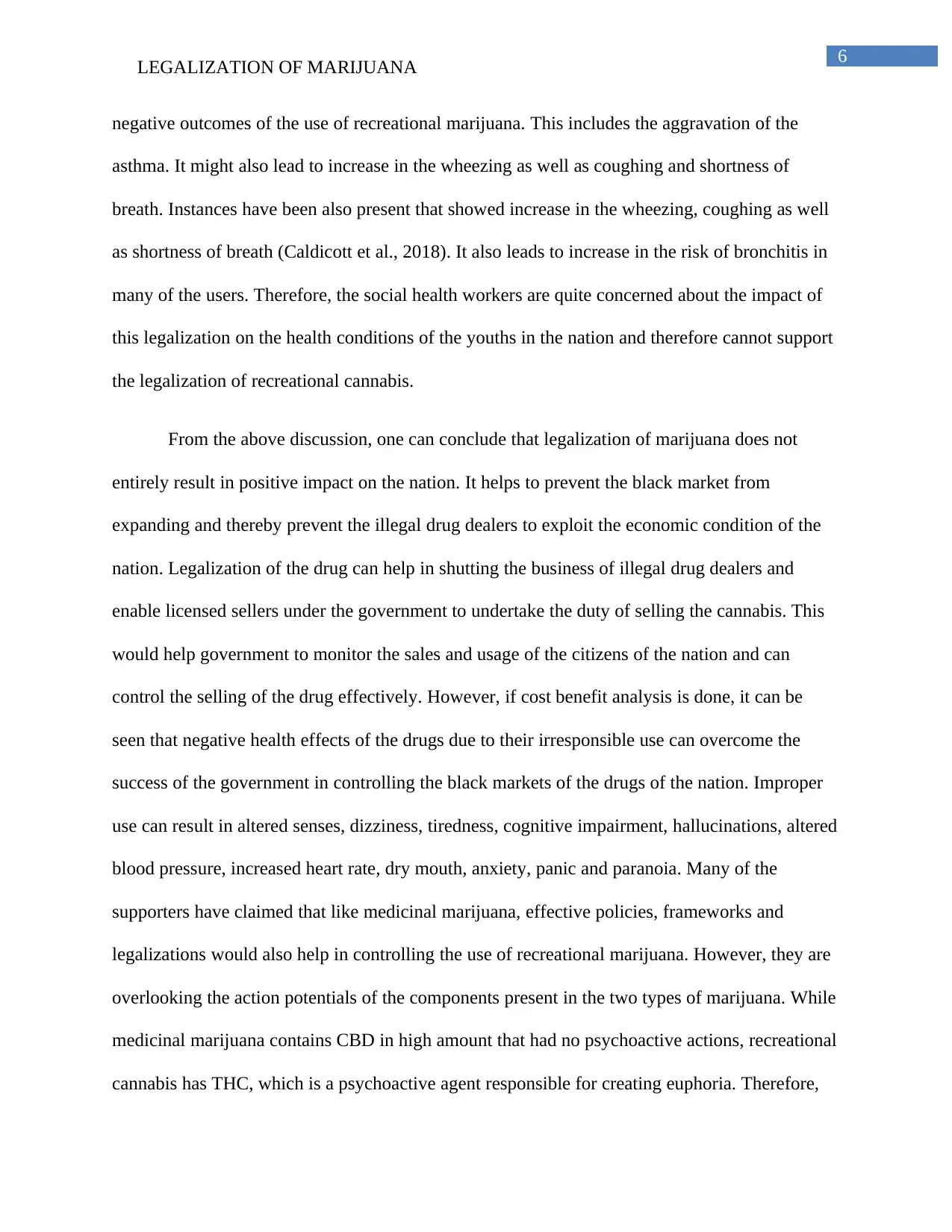
6
LEGALIZATION OF MARIJUANA
negative outcomes of the use of recreational marijuana. This includes the aggravation of the
asthma. It might also lead to increase in the wheezing as well as coughing and shortness of
breath. Instances have been also present that showed increase in the wheezing, coughing as well
as shortness of breath (Caldicott et al., 2018). It also leads to increase in the risk of bronchitis in
many of the users. Therefore, the social health workers are quite concerned about the impact of
this legalization on the health conditions of the youths in the nation and therefore cannot support
the legalization of recreational cannabis.
From the above discussion, one can conclude that legalization of marijuana does not
entirely result in positive impact on the nation. It helps to prevent the black market from
expanding and thereby prevent the illegal drug dealers to exploit the economic condition of the
nation. Legalization of the drug can help in shutting the business of illegal drug dealers and
enable licensed sellers under the government to undertake the duty of selling the cannabis. This
would help government to monitor the sales and usage of the citizens of the nation and can
control the selling of the drug effectively. However, if cost benefit analysis is done, it can be
seen that negative health effects of the drugs due to their irresponsible use can overcome the
success of the government in controlling the black markets of the drugs of the nation. Improper
use can result in altered senses, dizziness, tiredness, cognitive impairment, hallucinations, altered
blood pressure, increased heart rate, dry mouth, anxiety, panic and paranoia. Many of the
supporters have claimed that like medicinal marijuana, effective policies, frameworks and
legalizations would also help in controlling the use of recreational marijuana. However, they are
overlooking the action potentials of the components present in the two types of marijuana. While
medicinal marijuana contains CBD in high amount that had no psychoactive actions, recreational
cannabis has THC, which is a psychoactive agent responsible for creating euphoria. Therefore,
LEGALIZATION OF MARIJUANA
negative outcomes of the use of recreational marijuana. This includes the aggravation of the
asthma. It might also lead to increase in the wheezing as well as coughing and shortness of
breath. Instances have been also present that showed increase in the wheezing, coughing as well
as shortness of breath (Caldicott et al., 2018). It also leads to increase in the risk of bronchitis in
many of the users. Therefore, the social health workers are quite concerned about the impact of
this legalization on the health conditions of the youths in the nation and therefore cannot support
the legalization of recreational cannabis.
From the above discussion, one can conclude that legalization of marijuana does not
entirely result in positive impact on the nation. It helps to prevent the black market from
expanding and thereby prevent the illegal drug dealers to exploit the economic condition of the
nation. Legalization of the drug can help in shutting the business of illegal drug dealers and
enable licensed sellers under the government to undertake the duty of selling the cannabis. This
would help government to monitor the sales and usage of the citizens of the nation and can
control the selling of the drug effectively. However, if cost benefit analysis is done, it can be
seen that negative health effects of the drugs due to their irresponsible use can overcome the
success of the government in controlling the black markets of the drugs of the nation. Improper
use can result in altered senses, dizziness, tiredness, cognitive impairment, hallucinations, altered
blood pressure, increased heart rate, dry mouth, anxiety, panic and paranoia. Many of the
supporters have claimed that like medicinal marijuana, effective policies, frameworks and
legalizations would also help in controlling the use of recreational marijuana. However, they are
overlooking the action potentials of the components present in the two types of marijuana. While
medicinal marijuana contains CBD in high amount that had no psychoactive actions, recreational
cannabis has THC, which is a psychoactive agent responsible for creating euphoria. Therefore,
Paraphrase This Document
Need a fresh take? Get an instant paraphrase of this document with our AI Paraphraser
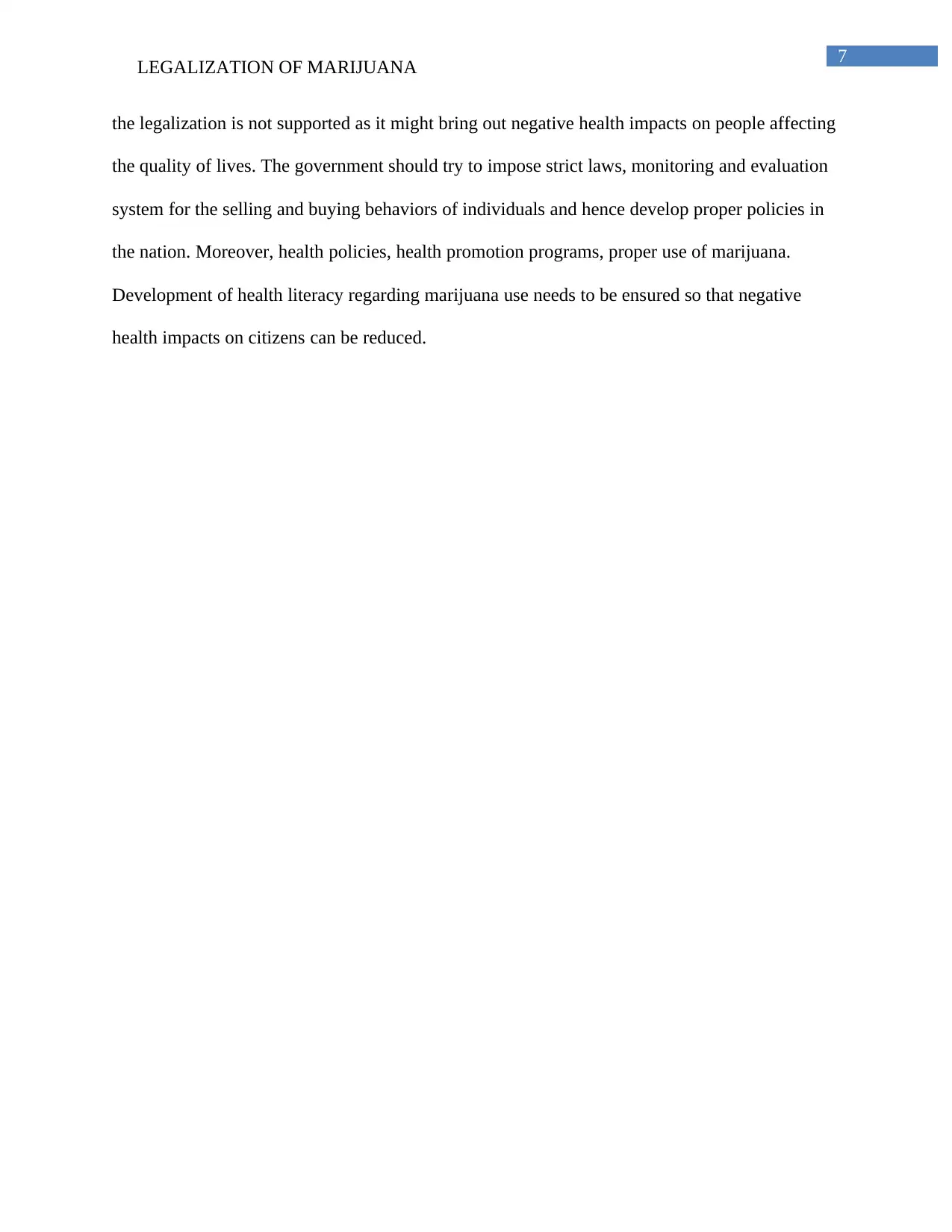
7
LEGALIZATION OF MARIJUANA
the legalization is not supported as it might bring out negative health impacts on people affecting
the quality of lives. The government should try to impose strict laws, monitoring and evaluation
system for the selling and buying behaviors of individuals and hence develop proper policies in
the nation. Moreover, health policies, health promotion programs, proper use of marijuana.
Development of health literacy regarding marijuana use needs to be ensured so that negative
health impacts on citizens can be reduced.
LEGALIZATION OF MARIJUANA
the legalization is not supported as it might bring out negative health impacts on people affecting
the quality of lives. The government should try to impose strict laws, monitoring and evaluation
system for the selling and buying behaviors of individuals and hence develop proper policies in
the nation. Moreover, health policies, health promotion programs, proper use of marijuana.
Development of health literacy regarding marijuana use needs to be ensured so that negative
health impacts on citizens can be reduced.
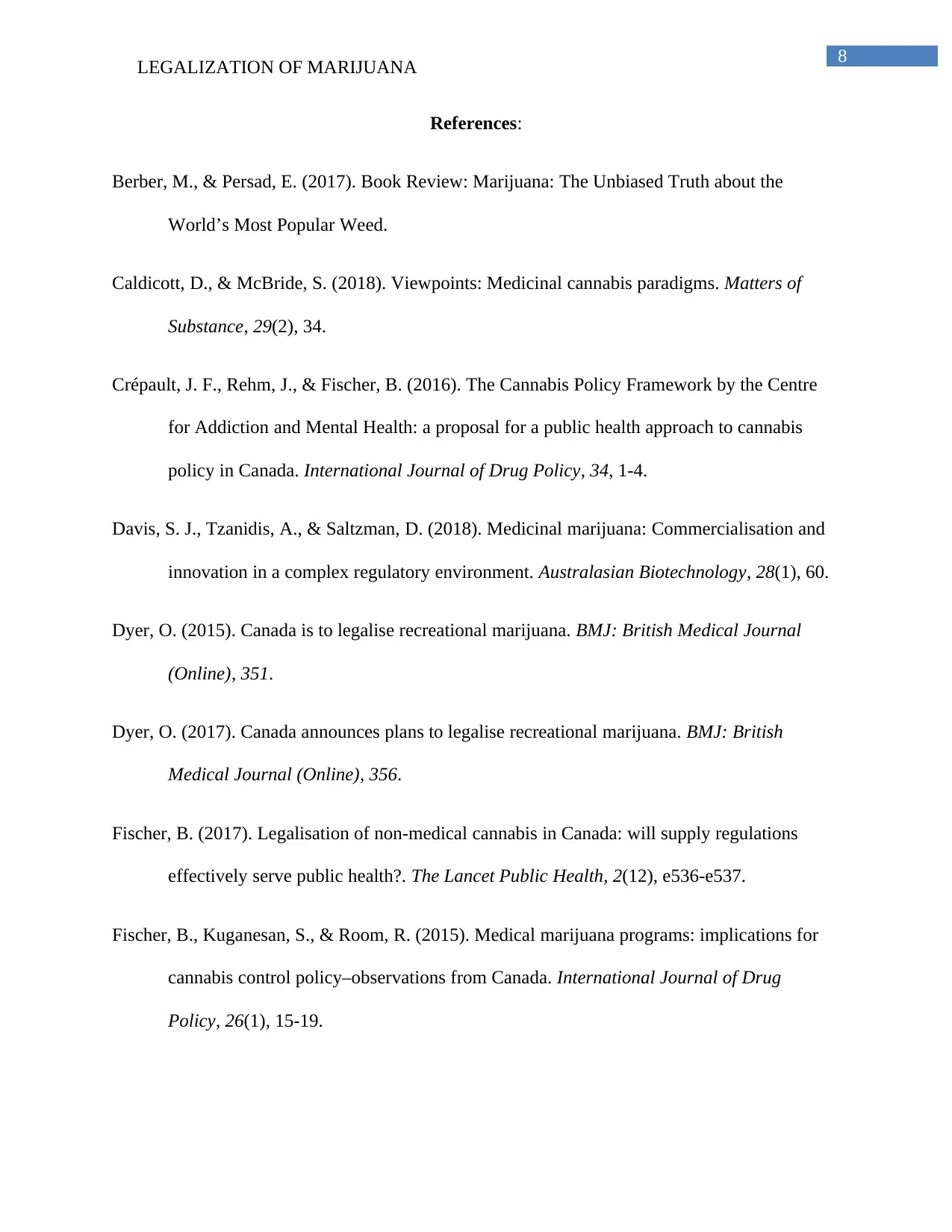
8
LEGALIZATION OF MARIJUANA
References:
Berber, M., & Persad, E. (2017). Book Review: Marijuana: The Unbiased Truth about the
World’s Most Popular Weed.
Caldicott, D., & McBride, S. (2018). Viewpoints: Medicinal cannabis paradigms. Matters of
Substance, 29(2), 34.
Crépault, J. F., Rehm, J., & Fischer, B. (2016). The Cannabis Policy Framework by the Centre
for Addiction and Mental Health: a proposal for a public health approach to cannabis
policy in Canada. International Journal of Drug Policy, 34, 1-4.
Davis, S. J., Tzanidis, A., & Saltzman, D. (2018). Medicinal marijuana: Commercialisation and
innovation in a complex regulatory environment. Australasian Biotechnology, 28(1), 60.
Dyer, O. (2015). Canada is to legalise recreational marijuana. BMJ: British Medical Journal
(Online), 351.
Dyer, O. (2017). Canada announces plans to legalise recreational marijuana. BMJ: British
Medical Journal (Online), 356.
Fischer, B. (2017). Legalisation of non-medical cannabis in Canada: will supply regulations
effectively serve public health?. The Lancet Public Health, 2(12), e536-e537.
Fischer, B., Kuganesan, S., & Room, R. (2015). Medical marijuana programs: implications for
cannabis control policy–observations from Canada. International Journal of Drug
Policy, 26(1), 15-19.
LEGALIZATION OF MARIJUANA
References:
Berber, M., & Persad, E. (2017). Book Review: Marijuana: The Unbiased Truth about the
World’s Most Popular Weed.
Caldicott, D., & McBride, S. (2018). Viewpoints: Medicinal cannabis paradigms. Matters of
Substance, 29(2), 34.
Crépault, J. F., Rehm, J., & Fischer, B. (2016). The Cannabis Policy Framework by the Centre
for Addiction and Mental Health: a proposal for a public health approach to cannabis
policy in Canada. International Journal of Drug Policy, 34, 1-4.
Davis, S. J., Tzanidis, A., & Saltzman, D. (2018). Medicinal marijuana: Commercialisation and
innovation in a complex regulatory environment. Australasian Biotechnology, 28(1), 60.
Dyer, O. (2015). Canada is to legalise recreational marijuana. BMJ: British Medical Journal
(Online), 351.
Dyer, O. (2017). Canada announces plans to legalise recreational marijuana. BMJ: British
Medical Journal (Online), 356.
Fischer, B. (2017). Legalisation of non-medical cannabis in Canada: will supply regulations
effectively serve public health?. The Lancet Public Health, 2(12), e536-e537.
Fischer, B., Kuganesan, S., & Room, R. (2015). Medical marijuana programs: implications for
cannabis control policy–observations from Canada. International Journal of Drug
Policy, 26(1), 15-19.
⊘ This is a preview!⊘
Do you want full access?
Subscribe today to unlock all pages.

Trusted by 1+ million students worldwide
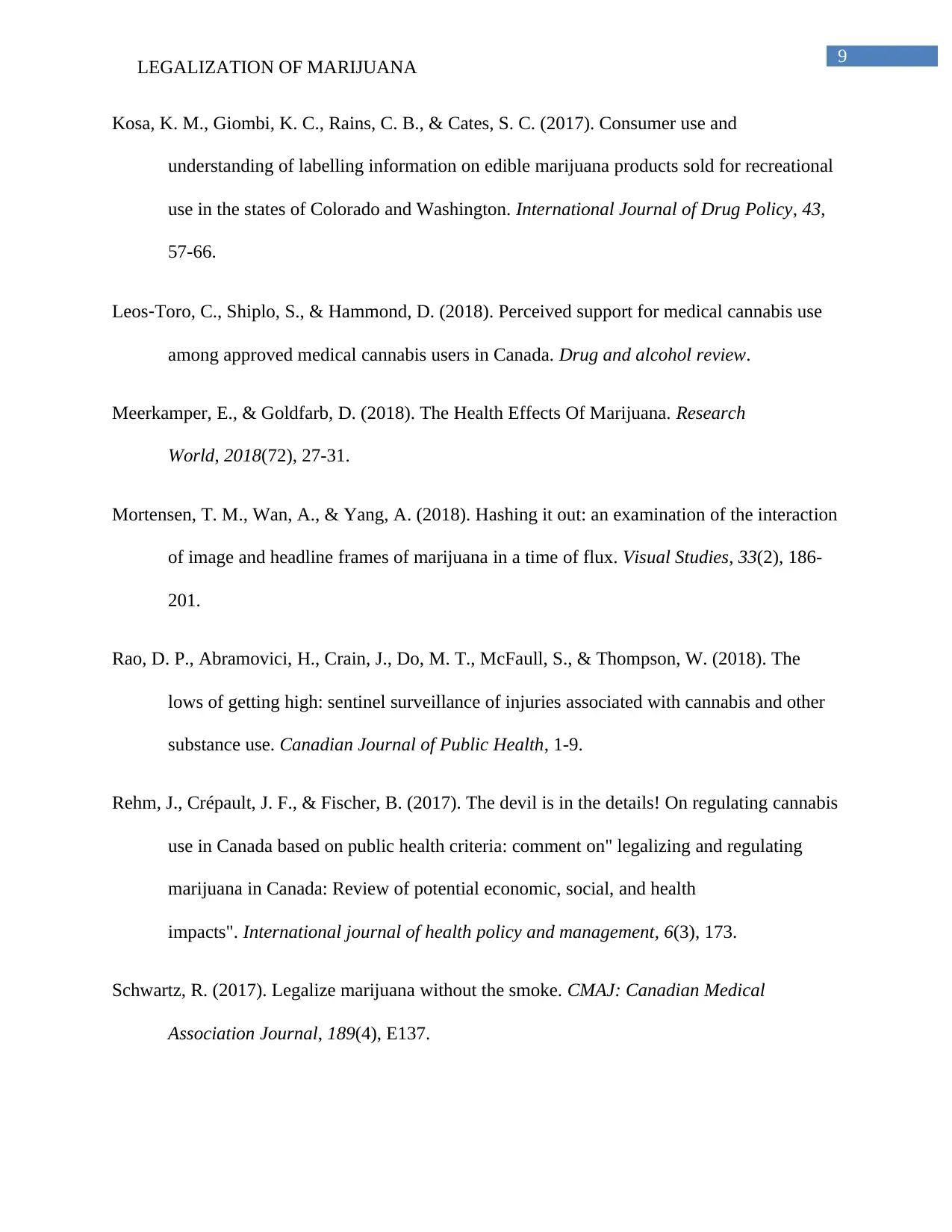
9
LEGALIZATION OF MARIJUANA
Kosa, K. M., Giombi, K. C., Rains, C. B., & Cates, S. C. (2017). Consumer use and
understanding of labelling information on edible marijuana products sold for recreational
use in the states of Colorado and Washington. International Journal of Drug Policy, 43,
57-66.
Leos‐Toro, C., Shiplo, S., & Hammond, D. (2018). Perceived support for medical cannabis use
among approved medical cannabis users in Canada. Drug and alcohol review.
Meerkamper, E., & Goldfarb, D. (2018). The Health Effects Of Marijuana. Research
World, 2018(72), 27-31.
Mortensen, T. M., Wan, A., & Yang, A. (2018). Hashing it out: an examination of the interaction
of image and headline frames of marijuana in a time of flux. Visual Studies, 33(2), 186-
201.
Rao, D. P., Abramovici, H., Crain, J., Do, M. T., McFaull, S., & Thompson, W. (2018). The
lows of getting high: sentinel surveillance of injuries associated with cannabis and other
substance use. Canadian Journal of Public Health, 1-9.
Rehm, J., Crépault, J. F., & Fischer, B. (2017). The devil is in the details! On regulating cannabis
use in Canada based on public health criteria: comment on" legalizing and regulating
marijuana in Canada: Review of potential economic, social, and health
impacts". International journal of health policy and management, 6(3), 173.
Schwartz, R. (2017). Legalize marijuana without the smoke. CMAJ: Canadian Medical
Association Journal, 189(4), E137.
LEGALIZATION OF MARIJUANA
Kosa, K. M., Giombi, K. C., Rains, C. B., & Cates, S. C. (2017). Consumer use and
understanding of labelling information on edible marijuana products sold for recreational
use in the states of Colorado and Washington. International Journal of Drug Policy, 43,
57-66.
Leos‐Toro, C., Shiplo, S., & Hammond, D. (2018). Perceived support for medical cannabis use
among approved medical cannabis users in Canada. Drug and alcohol review.
Meerkamper, E., & Goldfarb, D. (2018). The Health Effects Of Marijuana. Research
World, 2018(72), 27-31.
Mortensen, T. M., Wan, A., & Yang, A. (2018). Hashing it out: an examination of the interaction
of image and headline frames of marijuana in a time of flux. Visual Studies, 33(2), 186-
201.
Rao, D. P., Abramovici, H., Crain, J., Do, M. T., McFaull, S., & Thompson, W. (2018). The
lows of getting high: sentinel surveillance of injuries associated with cannabis and other
substance use. Canadian Journal of Public Health, 1-9.
Rehm, J., Crépault, J. F., & Fischer, B. (2017). The devil is in the details! On regulating cannabis
use in Canada based on public health criteria: comment on" legalizing and regulating
marijuana in Canada: Review of potential economic, social, and health
impacts". International journal of health policy and management, 6(3), 173.
Schwartz, R. (2017). Legalize marijuana without the smoke. CMAJ: Canadian Medical
Association Journal, 189(4), E137.
Paraphrase This Document
Need a fresh take? Get an instant paraphrase of this document with our AI Paraphraser

10
LEGALIZATION OF MARIJUANA
LEGALIZATION OF MARIJUANA
1 out of 11
Related Documents
Your All-in-One AI-Powered Toolkit for Academic Success.
+13062052269
info@desklib.com
Available 24*7 on WhatsApp / Email
![[object Object]](/_next/static/media/star-bottom.7253800d.svg)
Unlock your academic potential
Copyright © 2020–2025 A2Z Services. All Rights Reserved. Developed and managed by ZUCOL.



